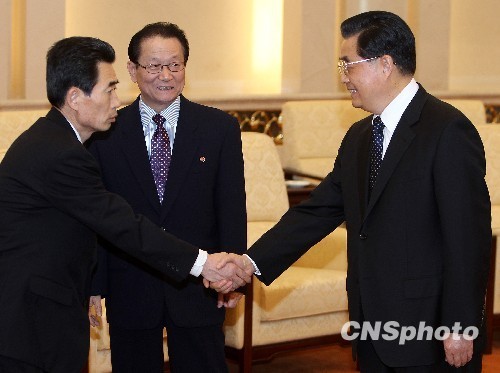Six-party talks gain traction
Top nuclear envoys from Washington and Seoul arrive in Beijing Wednesday to seek details of recent meetings between Beijing and Pyongyang and to discuss how to bring the Democratic People's Republic of Korea (DPRK) back to the negotiating table.
|
 Kim Yong-il (second from left), director of the International Affairs Department of the Central Committee of the Workers' Party of Korea, conveyed greetings from top DPRK leader Kim Jong-il to President Hu Jintao when they met at the Great Hall of the People in Beijing on February 23, 2010. |
Kim Yong-il, director of the International Affairs Department of the Central Committee of the Workers' Party of Korea, conveyed greetings from top DPRK leader Kim Jong-il to President Hu Jintao when they met at the Great Hall of the People in Beijing on Tuesday.
In talks earlier on Tuesday with his Chinese counterpart Wang Jiarui, head of the International Department of the Communist Party of China Central Committee, the two touched upon denuclearization of the Korean Peninsula, the Foreign Ministry said. No details, however, were released.
Wang was in the DPRK from Feb 6 to 9, and in the closely-watched trip, met Kim Jong-il. A day later, DPRK Deputy Foreign Minister Kim Gye-gwan, also the country's top nuclear negotiator, visited China.
"(Through the recent visits) China has earned considerable concessions on preconditions by the DPRK for restarting the Six-Party Talks," Seoul's Yonhap News Agency reported on Tuesday.
Also on Tuesday, the top nuclear envoys from Washington and Seoul set off for Beijing to discuss with their Chinese counterpart Wu Dawei ways to bring Pyongyang back on track for talks.
"The series of meetings are not a coincidence," said Liu Jiangyong, an expert on East Asian studies at Beijing-based Tsinghua University.
"As the Chinese authorities return to work after the Spring Festival holidays, the DPRK, the US and the Republic of Korea (ROK) are strengthening efforts for the resumption of Six-Party Talks," he said.
Pyongyang has come under increasing pressure to take a more conciliatory path and return to the six-nation talks, which also involve Japan and Russia.
"In a couple of cases, there have been meetings recently with North Korean officials, and we're going to be consulting to see where we think we stand in the process," Philip J. Crowley, spokesman for the US Department of State, said on Tuesday.
"We are looking for a signal from North Korea, and we're still waiting for that signal," he said.
ROK Foreign Minister Yu Myung-hwan said on Tuesday that his country was closely monitoring the meetings between Chinese and DPRK officials.
"It is too soon to tell whether the recent meetings, and their seemingly positive ramifications, will lead to the immediate resumption of Six-Party Talks, but we are keenly monitoring the results of the meetings to focus all our diplomatic efforts in resuming negotiations."
However, Zhang Liangui, an expert on Korean affairs at the Central Party School, said it is too early to expect breakthroughs.
Pyongyang has set three preconditions for resuming talks: A peace treaty with the US, lifting of UN sanctions, and more economic aid, Zhang said. "But the US is unlikely to accede to any of them."
Zhang said a priority of the US envoy's China trip is to lobby Beijing to persuade Pyongyang to return to talks before discussing its demands.
"It's hard to say how much consensus can be reached between the two. China has not yet clearly expressed its position on whether to accept the DPRK's conditions before the Six-Party Talks".
He also said Kim Yong-il is likely to have discussed about more Chinese aid, as the DPRK economy is reeling under UN sanctions and the recent currency reform.
"It's an urgent issue for DPRK and a realistic problem for China, too."
A senior UN official who visited Pyongyang on Monday strongly defended international food aid to the DPRK.
"These are human beings that need the food. It's not the political system. This should not be argued in a political way," UN Under-Secretary-General for Political Affairs Lynn Pascoe, who earlier this month was the first top-level UN official to visit the country in six years, told CNN.
The Six-Party Talks were launched in 2003 but have not made any progress since April 2009 when the DPRK pulled out of the talks to protest the UN condemnation of its missile tests.
The US State Department has, for now, ruled out the possibility of US officials going to Pyongyang or meeting DPRK officials in China.
 0
0 






